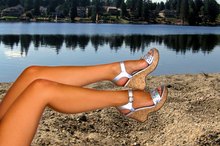What does fact checked mean?
At Healthfully, we strive to deliver objective content that is accurate and up-to-date. Our team periodically reviews articles in order to ensure content quality. The sources cited below consist of evidence from peer-reviewed journals, prominent medical organizations, academic associations, and government data.
The information contained on this site is for informational purposes only, and should not be used as a substitute for the advice of a professional health care provider. Please check with the appropriate physician regarding health questions and concerns. Although we strive to deliver accurate and up-to-date information, no guarantee to that effect is made.
What Happens If You Do Not Use Sunscreen When You Use Retin-A?
Retin-A is one of the brand names of tretinoin, a type of retinoid only available by prescription, as opposed to the similar but gentler, over-the-counter retinols 1. Retin-A and other retinoids are backed by 25 years of research and proven to improve skin issues, including acne and problems associated with aging and sun damage, such as wrinkling and discoloration. Since Retin-A is working to undo damage caused by the sun, it makes sense that dermatologists recommend protecting skin treated with retinoids from the sun to help maintain results, as well as preventing undesirable effects.
Efficacy
Retinoids, as well as retinols, are photo-inactivated, meaning exposure to direct sunlight makes them less effective. For this reason, they are normally prescribed to be used at night, right before going to bed. UVA, or long-wave rays found in the sun and the primary ray used in tanning booths, break down this active ingredient the most and are able to penetrate glass. The sun's UVB shortwaves also degrades tretinoin, as does as any visible light 1. If your Retin-A is less effective, you won't get the full benefits of this highly effective treatment and may be prone to stop using it. Since retinoids work best over a long period of time, you should wear sunscreen and look forward to better skin.
- Retinoids, as well as retinols, are photo-inactivated, meaning exposure to direct sunlight makes them less effective.
- UVA, or long-wave rays found in the sun and the primary ray used in tanning booths, break down this active ingredient the most and are able to penetrate glass.
Sensitivity
Damaged Thin Skin
Learn More
Because Retin-A helps replace older skin with fresh, new cells, skin treated with this cream is more prone to sunburn, especially in the first several weeks of use. Retin-A should not be applied to skin that is sunburned or windburned, so you'll lose valuable treatment time, waiting until your skin is healthy enough to restart your skincare regimen if you experience a burn. Some animal studies have shown that tretinoin caused skin tumors to develop faster when the treated area was exposed to UV light from the sun or sunlamps 1.
Cancer
Exposing unprotected skin to excessive UV radiation not only gives you sunburn, but can cause changes in skin cells that lead to skin cancer. Sunburns may also increase your chances of developing melanoma, the most serious form of skin cancer, later in life. Because using Retin-A puts you at a higher risk for sunburn, you also run the risk of developing non-melanoma skin cancers, such as:
- the face
- ears
Sunscreen
How to Reduce Redness With Retin-A
Learn More
To stay safe and get the best results from Retin-A, wear sunscreen daily with an SPF of 15 or higher that protects you from both UVA and UVB rays with labels using phrasing like broad-spectrum, multi-spectrum, zinc oxide and UVA/UVB protection. If you're planning a day outdoors, use a water-resistant, broad-spectrum sunscreen with an SPF of 30 or higher. Apply a generous amount of sunscreen 30 minutes before going out and reapply every two hours and excessive sweating or swimming. See your doctor every year for a professional skin exam.
- To stay safe and get the best results from Retin-A, wear sunscreen daily with an SPF of 15 or higher that protects you from both UVA and UVB rays with labels using phrasing like broad-spectrum, multi-spectrum, zinc oxide and UVA/UVB protection.
Related Articles
References
- Mayo Clinic: Tretinoin
- The Dr. Oz Show: Anti-Aging: Why Retinols Work
- Dr. Cynthia Bailey Skin Care: Does light break down tretinoin (Retin A) cream?
- The Skin Cancer Foundation: Understanding UVA and UVB
- The Skin Cancer Foundation: Facts about Sunburn and Skin Cancer
- Valeant Pharmaceuticals North America LLC. Retin-A Micro (tretinoin) Gel microsphere. Updated January 2014.
- Ortho-McNeil Pharmaceutical, Inc. RETIN-A® (tretinoin). Published June 10, 2002.
- Zaenglein AL, Pathy AL, Schlosser BJ, et al. Guidelines of care for the management of acne vulgaris. J Am Acad Dermatol. 2016;74(5):945-73.e33. doi:10.1016/j.jaad.2015.12.037
- Valeant Pharmaceuticals North America LLC. Retin-A Micro (tretinoin) Gel microsphere. Updated January 2014.
- Kircik LH. Evaluating Tretinoin Formulations in the Treatment of Acne. Journal of Drugs in Dermatology. 2014 Apr;13(4):466-70.
- Nohynek GJ. Commentary on the Safety of Topical Vitamin A in Cosmetics. Regululatory Toxicology and Pharmacology. 2017 Oct;89:302-304. doi:10.1016/j.yrtph.2017.08.002
- Watson KD, Miest RY, Tollefson MM. Isotretinoin for Acne and Rosacea. Seminars in Cutaneous Medicine and Surgery. 2016 Jun;35(2):79-86. doi:10.12788/j.sder.2016.023
Writer Bio
Hilary White is a professional writer and editor based in San Diego. White has been writing articles on fashion, style, fitness, nutrition, movies and entertainment since 1994. Her articles have been published in "Westways" magazine, "Pages" magazine, "Book Street USA," "Magill's Cinema Annual," and numerous titles from Visible Ink Press. White holds a bachelor's degree in English from Michigan State University.









